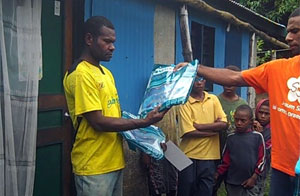Australia is helping to stamp out malaria in Vanuatu. AusAID is working closely with Vanuatu's Ministry of Health and other development partners so people will no longer get sick or die from this all-too-common tropical disease. Following fever, headache, chills and vomiting, malaria can progress to severe illness which can return again even years after the first infection. Young children, pregnant women, and people with other illnesses are at particular risk.
The combined efforts of donors and the Government have seen major improvements in reducing illness and death from malaria in Vanuatu, especially in the last two years. New measures include rapid tests for malaria in all health facilities and more effective treatments.
Tafea Province provides a promising example of the results such joint efforts can achieve, and could well be on its way to being malaria-free by 2014.
This very ambitious target was set for Tafea in 2008 to motivate managers, health workers and communities to put extra effort into reducing illness and death from malaria across the province. 1,006 people became sick with malaria in 2007. By 2009, this had dropped to 297 people, then 69 people in 2010. Only ten people have contracted malaria so far in 2011, showing what a difference the extra effort can make.
Experience and support from the World Health Organization is proving vital in planning and managing the malaria programs. Along with AusAID and the Global Fund to Fight AIDS Tuberculosis and Malaria, they are supporting the Ministry of Health to provide free insecticide-treated bed nets to all citizens. In selected areas, homes will also be sprayed indoors every year for the next three years. This will help further control mosquitoes and reduce the likelihood they will infect people with malaria.
Getting communities on-board has been one of the most important factors for success – for example, families getting their homes ready for spraying, and men, women and children all understanding the importance of sleeping under their bed nets. With the right education, children in primary schools around Vanuatu are encouraging their families to take the malaria messages seriously. This includes knowing that they should seek treatment quickly if a household member feels symptoms of malaria, and being careful to take the medicine correctly.
Deputy Manager of the Vector-Borne Disease Control Programme within the Ministry of Health, Timothy Quai, is unequivocal: 'The communities are very supportive. There is a continuous dialogue with chiefs from all over the province. They pass on information to the villagers about strategies and they update everyone on the progress achieved.'
The main hospital has reported decreasing numbers of patients turning up for treatment. 'There has been a noticeable decline in numbers of malaria in Tafea Province,' confirms Quai.

